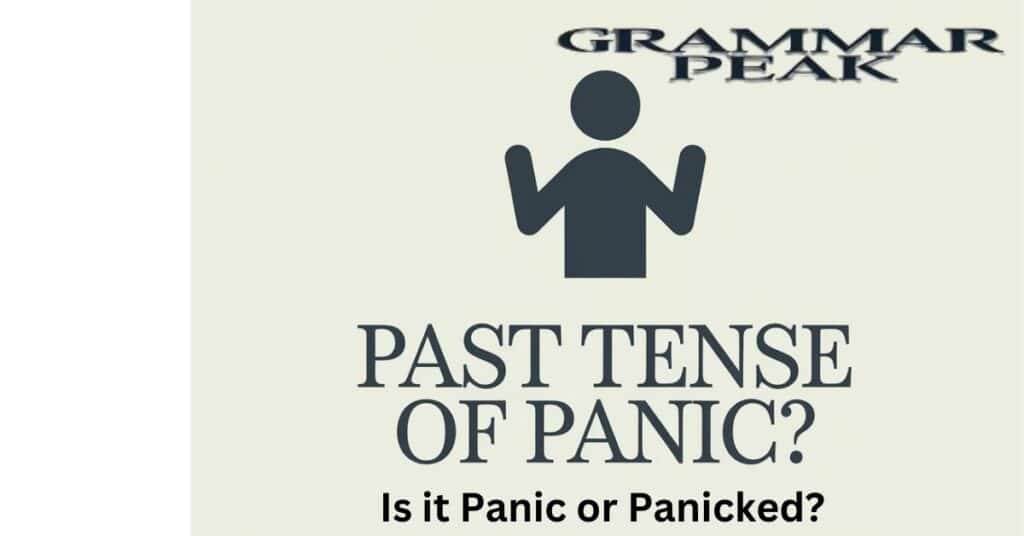Panic is a common emotional state that we all experience from time to time, but do you know the correct past tense form of this verb? Is it “panic” or “panicked”? In this comprehensive blog post, we’ll explore the meaning, usage, and pronunciation of these words, as well as provide a handy verb tense table and examples of how to use them in everyday conversations.
Whether you’re a native English speaker or learning the language, understanding the proper past tense of “panic” is crucial for effective communication. Let’s dive in and master this important grammatical concept together!
What does the Word “Panic” Mean?
“Panic” as a Noun:
As a noun, “panic” refers to an overwhelming fear or anxiety that can strike suddenly. This emotional state often leads to irrational behavior. For instance, during a fire drill, a loud alarm might create a sense of panic among students, causing them to rush to the exits without thinking clearly.
In everyday conversations, “panic” can also describe a situation where people experience intense fear. An example is when someone sees a spider and screams in panic, prompting others nearby to react with alarm. This shows how panic can spread quickly in a group, turning a small scare into a collective emotional response.
“Panic” as an Adjective:
When used as an adjective, “panic” describes situations or reactions that are directly related to feelings of panic. For example, in the phrase “panic buying,” it refers to the rush to purchase goods when people fear shortages, often leading to empty shelves in stores. This illustrates how panic can drive behavior, even in everyday shopping.
Another example is in the term “panic attack.” This refers to a sudden episode of intense fear that triggers severe physical reactions when there is no real danger. Such panic attacks can leave individuals feeling helpless, highlighting the profound impact of panic on both mental and physical health.
“Panic” as a Verb:
As a verb, “panic” means to suddenly feel or exhibit panic. For example, “The student panicked when she realized she had forgotten her notes for the presentation.”
Must Be Read What’s the Past Tense of Panic? Is it Panic or Panicked?
Past Tense of Panic
The past tense of the verb “panic” is “panicked.” This is a regular verb, meaning the past tense is formed by adding the “-ed” suffix to the base form of the word. For instance, you might say, “During the earthquake, many people panicked and rushed for safety.” This illustrates how the emotional response of panic can influence actions in urgent situations.
Understanding the past tense of “panic” helps clarify its usage in different contexts. When describing an event that has already occurred, saying “she panicked” clearly indicates that the feeling of panic was experienced in the past. This grammatical structure is essential for effective communication about emotional states and reactions.
How to Pronounce “Panic” and “Panicked”
The word “panic” is pronounced as “PAN-ik,” with the accent on the first syllable. The past tense form “panicked” is pronounced as “PAN-ikt,” with the accent still on the first syllable and the addition of the “t” sound at the end.
The Simple Verb Tense Table
| Tense | Example | Description |
| Present | I feel panic. | Action happening right now. |
| Present Continuous | I am feeling panic. | Action happening right now and continuing. |
| Present Perfect | I have felt panic. | Action completed recently with relevance to now. |
| Present Perfect Continuous | I have been feeling panic. | Action started in the past and continuing to now. |
| Past | I felt panic. | Action completed in the past. |
| Past Continuous | I was feeling panic. | Action ongoing in the past. |
| Past Perfect | I had felt panic. | Action completed before another past action. |
| Past Perfect Continuous | I had been feeling panic. | Action ongoing until another past action. |
| Future | I will feel panic. | Action to be completed in the future. |
| Future Continuous | I will be feeling panic. | Action ongoing in the future. |
| Future Perfect | I will have felt panic. | Action completed before a future reference point. |
| Future Perfect Continuous | I will have been feeling panic. | Action ongoing until a future reference point. |
you Might be What’s the Past Tense of Panic? Is it Panic or Panicked?
Usage of “Panic” and “Panicked” in Everyday Conversations
Panic:
- I felt a sudden panic when I realized I had lost my wallet.
- The team’s panic in the final minutes of the game led to a costly turnover.
- She tried to stay calm, but a wave of panic washed over her when she heard the loud noise.
- During the meeting, there was a moment of panic when the projector stopped working.
- He experienced panic when he saw the approaching storm while hiking.
- The unexpected news caused a panic among the employees about potential layoffs.
- I could sense the panic in her voice when she called me about the car accident.
- The children’s panic during the fire drill showed how unprepared they were for emergencies.
- When the elevator suddenly stopped, a feeling of panic spread through the passengers.
- She managed to control her panic and focused on finding a solution to the problem.
Panicked:
- He panicked when he realized he had left his wallet at home just before heading to the store.
- The team panicked after losing their lead in the final minutes of the game.
- She panicked when she couldn’t find her phone during the crowded concert.
- The children panicked when they got lost in the amusement park and couldn’t find their parents.
- He panicked when the car started making strange noises on the highway.
- She panicked as the elevator doors began to close, and she wasn’t inside yet.
- The dog panicked during the thunderstorm, running around the house in fear.
- He panicked when he saw the smoke coming from the kitchen and realized dinner was burning.
- She panicked at the thought of giving a speech in front of a large audience.
- The travelers panicked when they heard the announcement about their delayed flight.
Synonyms of Panic
- Alarm
- Fear
- Anxiety
- Dismay
- Terror
- Fright
- Distress
- Hysteria
- Trepidation
- Agitation
- Shock
- Apprehension.
FAQ” S
What is the difference between “panic” and “panicked”?
“Panic” is a noun or verb, while “panicked” is the past tense of the verb.
Can “panic” be used as a verb?
Yes, “panic” can be used as both a noun and a verb.
Is “panicked” an adjective?
Yes, “panicked” can also function as an adjective describing a state of fear or anxiety.
When should I use “panic”?
Use “panic” when referring to the feeling or act of panicking in the present or as a noun.
When is “panicked” appropriate to use?
Use “panicked” when describing someone who has experienced panic in the past.
.
Conclusion
In conclusion, the past tense of the verb “panic” is “panicked,” not “panic.” This is an important distinction to remember when using these words in your writing and speech. By understanding the correct usage of “panic” and “panicked,” you can improve your English language skills and communicate more effectively. Remember to practice using these words in a variety of contexts, and refer back to the verb tense table and examples provided in this article. With a little bit of effort, you’ll be a panic and panicked pro in no time!

Mason Blake is an experienced blogger with a passion for language and communication. With years of expertise in crafting informative and engaging content, Mason shares valuable insights on grammar and writing. His clear, concise, and reader-friendly approach has earned him a loyal following, helping readers sharpen their language skills and master the art of effective communication.








Venture into the breathtaking realm of EVE Online. Test your limits today. Build alongside thousands of pilots worldwide. Join now
https://sochistroygroup.ru/ – передовые решения
проекты домов сочи – Проекты домов с гаражом
https://www.sochistroygroup.ru/ – проверенный портал
http://www.sochistroygroup.ru – витрина
http://sochistroygroup.ru/ – бюджетные проекты
https://www.sochistroygroup.ru/ – цифровая платформа
дом для пмж в сочи – Магазины и поликлиники
http://www.sochistroygroup.ru – онлайн-платформа идей
http://www.sochistroygroup.ru – проектные решения
https://sochistroygroup.ru/ – ресурс о ремонте и стройке
https://www.sochistroygroup.ru – онлайн-гид по стройке
https://www.sochistroygroup.ru/ – строительный дайджест
http://sochistroygroup.ru/ – строительные чертежи
проект морской сочи дом – Дом с устойчивыми к соли материалами
sochistroygroup.ru/ – онлайн-визуализация
https://www.sochistroygroup.ru – строительный сайт
sochistroygroup.ru – решения для загородного дома
https://www.sochistroygroup.ru/ – сайт экспертов
https://sochistroygroup.ru/ – страница проекта
https://sochistroygroup.ru – идеи для участка
sochistroygroup.ru/ – строительные советы онлайн
https://www.sochistroygroup.ru – передовые решения
sochistroygroup.ru/ – строительный сайт
https://www.sochistroygroup.ru/ – энергосберегающие решения
https://sochistroygroup.ru/ – лучшие коттеджи
https://sochistroygroup.ru/ – строительство с нуля
http://sochistroygroup.ru – строительные руководства
http://sochistroygroup.ru – проверенные решения
sochistroygroup.ru/ – надёжные услуги
http://sochistroygroup.ru/ – реальные истории стройки
sochistroygroup.ru – онлайн-страница
http://sochistroygroup.ru/ – проверенные проекты
http://sochistroygroup.ru – строительные ресурсы XXI века
строительство таунхаусов сочи – Клубный формат
http://sochistroygroup.ru – лучшие решения для дома
http://www.sochistroygroup.ru – строительные чертежи
http://www.sochistroygroup.ru – онлайн-чек-листы
https://www.sochistroygroup.ru – решения для дизайнеров
http://sochistroygroup.ru/ – путеводитель по ремонту
новостройки сочи частные дома – Современные планировки
прорабы сочи – Координация работ
https://www.sochistroygroup.ru/ – технологичные дома
минимализм дом сочи – Естественное освещение
sochistroygroup.ru – путеводитель по ремонту
дом 5 спален сочи – Дом с сенсорными панелями управления в спальнях
http://sochistroygroup.ru/ – экологичные дома
http://www.sochistroygroup.ru – идеи для участка
sochistroygroup.ru – строительная подборка
строительство домов сочи – Строительство домов по индивидуальным проектам
https://sochistroygroup.ru – строительная подборка
строительство дома 4 месяца сочи – Строительство с мая по август
http://sochistroygroup.ru/ – строительные подсказки